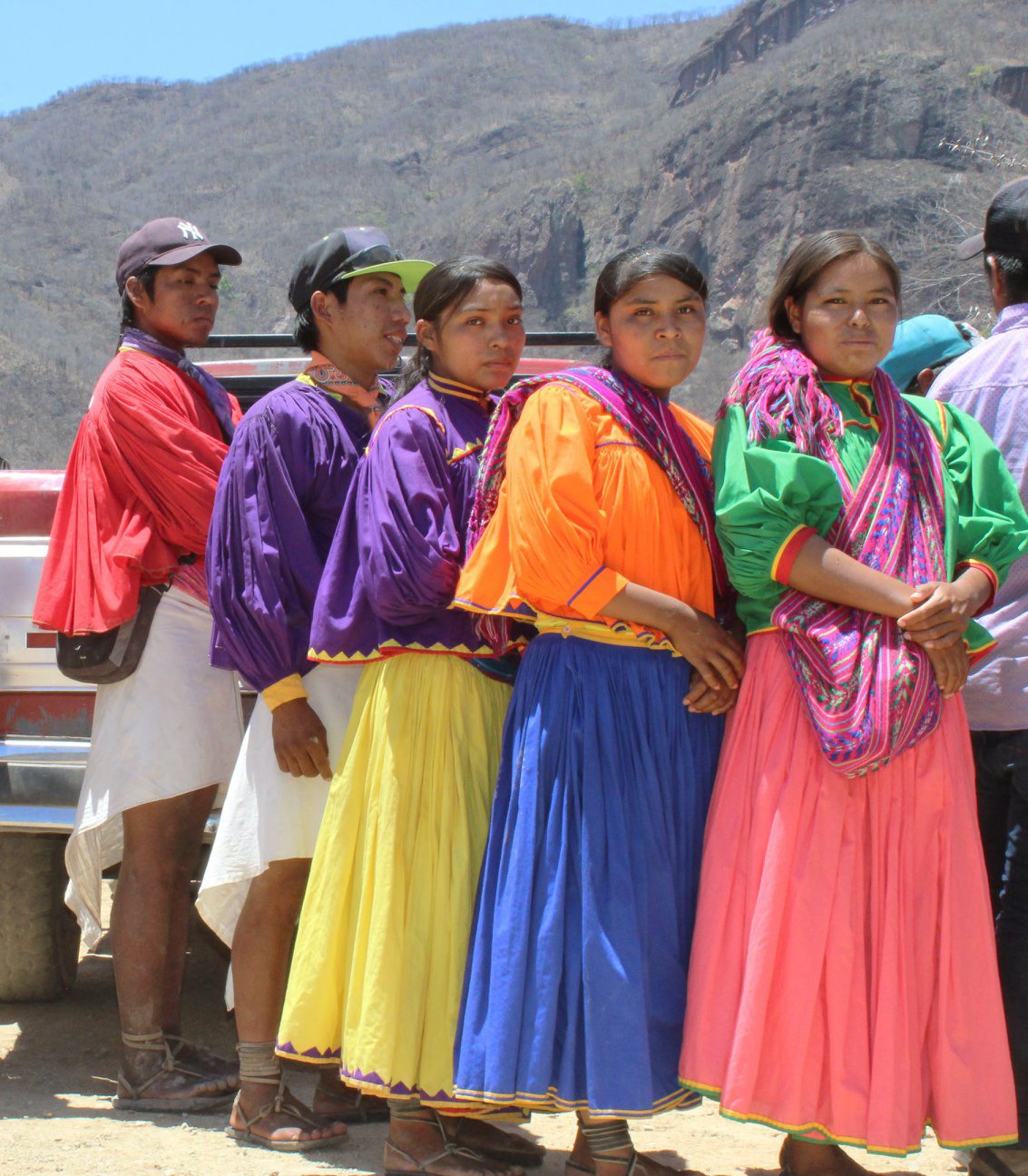
Rarámuri
The Rarámuri/Ralámuli, meaning “The light-footed ones” or “Those with light feet,” are a group of indigenous people living in the Northern state of Chihuahua, México.
Settled in the mountain range of the Sierra Tarahumara, they became known around the world as the barefoot runners of extreme long distances.
Their main activity is corn agriculture, a fundamental part of their livelihood and ceremonial activities. Some settlements have been displaced from their original land and now live in marginalized areas in the city and have been forced to work and assimilate to urban life as a survival strategy.
They have been a displaced culture that fights to maintain their traditional ways of life, a culture that values above all their relationship to the natural world.
Women wear their handmade typical clothing, full of vibrant and colorful patterns, men’s traditional clothing is made out of Manta, similar to canvas, as a staple fabric. Their arts and crafts are expressions of a way of life which emphasizes harmony and balance, as seen in their basket weaving, pottery and textiles which are earthy and spiritual, a veneration of nature.
Photos by: Jaime Aventura (1-6), Luis Escobar (5), Jose Adolfo Fierro (7-8)
Quienes son los Rarámuri
Los Rarámuri/Ralámuli, que significa "Los pies ligeros" o "Aquellos con pies ligeros", son un grupo de indígenas que viven en el estado norte de Chihuahua, México.
Establecidos en la cordillera de la Sierra Tarahumara, se hicieron conocidos en todo el mundo como los corredores descalzos de largas distancias extremas.
Su actividad principal es la agricultura de maíz, una parte fundamental de su sustento y actividades ceremoniales. Algunos asentamientos han sido desplazados de su tierra original y ahora viven en zonas marginadas de la ciudad y se han visto obligados a trabajar y asimilarse a la vida urbana como estrategia de supervivencia.
Han sido una cultura desplazada que lucha por mantener sus formas de vida tradicionales, una cultura que valora sobre todo su relación con el mundo natural.
Las mujeres usan su ropa típica hecha a mano, llena de patrones vibrantes y coloridos, la ropa tradicional de los hombres está hecha de Manta. Sus artes y oficios son expresiones de una forma de vida que enfatiza la armonía y el equilibrio, como se ve en sus tejidos de palmilla, cerámicas y textiles que son espirituales y hechos a mano, una veneración a la naturaleza.
Jepiká jú Ralámuli
Ralámuli ko belá wé awáname ka ruwá ba, chabóchi ko achaní mápi ralámuli ko “pies ligeros” aniwaame jú, chi regá la. Ralámuli ko Estado Chihuahua goná peré, jéna’i México.
Sierra Tarahumara anelíwachi goná peré, wé belá minábi a machiiru mápi gíte ajaré ralámuli wé awáname jú iyúma, né machí raléga.
Ralámuli ko a sunú echagá okoá ba ámi sierra goná ko, sunú ko wé natéame niráwa ba, wé omáwiwame jú. Jéna’i, siuráchi Chihuahua, ralámuli ko pe a suwéki ayé peré, échi mi belá juláiru ba. Jípe ko ralámuli má a wé nocha siuráchi chó, a belá chó winomí ménali ba.
A belá chó wé achaní mápi ke tási wekawásare abóni ra’íchaala, abóni nátala, abóni machíala, ayéna chó wé natéame nirá omána gawichí nirúame.
Umugí ralámuli ko né abóni a newaame káme sipúcha napácha ma, né ga’mi yókiramiti jú tu, mápi etéwi tagóla, wisíbala ma chiní “manta” anelíwame náti niwiiwa ba, rosákame belá jú tu échi chiní ko. Ralámuli ko belá wé natéame nirá omána gawichí nirúame tu, échi gíte belá namúti gawichí nirúame náti newá onogá walí, se’lé, iséni okó ma náti ba.









